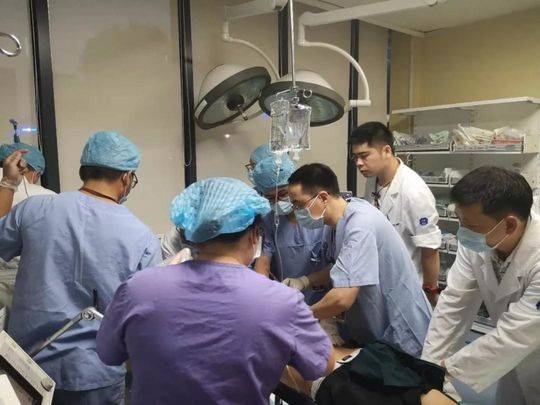Stanford scientists want you to boldly go where no one has gone before. Specifically,Anne Marie Gonzales Archives that would be into a camera-laden toilet that scans and recognizes your analprint.
According to a paper published today in the journal Nature, researchers at the storied university have devised a system for tracking defecation and urination by specific individuals over time, sending that data to the cloud, and analyzing it for the purposes of public health. It's the latest addition to a long line of smart toilets, although this may be the first one to take a picture of your asshole.
The so-called Precision Health Toilet is equipped with four cameras: the stool camera, anus camera, and two uroflow cameras. Combined, they allow the toilet to analyze users' urine and "[classify] stool according to the Bristol stool form scale using deep learning[.]"
Notably, the toilet uses a form of two-factor authentication to ensure it associates the right poop with the right person. By employing both a fingerprint scanner embedded in the flush lever, and the aforementioned "analprint scan," the researchers hoped to prevent mixups involving shared toilets.
"The potential for using the human anus as a biometric identifier is not a new concept," writes study co-author Dr. Seung-min Park in an accompanying blog post. "The famous painter, Salvador Dalí (1904-1989), had already figured out that the anus has 35 or 37 creases, which are as unique as fingerprints."
 Quite the scan. Credit: screenshot / nature
Quite the scan. Credit: screenshot / nature Importantly, you data does not remain with the toilet, but rather is sent to the cloud for later analysis.
"All collected data (images and videos), in their raw data formats, were annotated with respect to the user and transmitted to a cloud system through wireless communication," explains the study.
When reached for comment over email, Dr. Seung-min Park told Mashable that users' privacy is of the utmost concern.
"We unconditionally ensure the security of all photos and private information of our users are enforced through end-to-end encrypted data transmission," wrote Dr. Park. "We have employed a template matching algorithm to determine the region of interest (anus), which once fully developed and validated, will be autonomous without any human interaction."
 Technical. Credit: SCREENSHOT / NATURE
Technical. Credit: SCREENSHOT / NATURE What's more, Dr. Park added that the actual photos of users' anuses will be "encrypted by a hash function and stored on a secured device."
Dr. Park writesthat the development of the Precision Health Toilet is a first step in a much longer-term effort to more broadly diagnose a host of diseases and disorders in the general population including benign prostatic hyperplasia, irritable bowel syndrome, and urinary tract infections.
SEE ALSO: The weird science behind smart toilets and your pee
"This toilet system is expected to have a major impact on health monitoring research," concludes the study, "as the toilet enables longitudinal monitoring of human health with minimal interference of human behavior."
That is, if everyone can overcome their embarrassment first.
(Editor: {typename type="name"/})
 Ireland fines TikTok $600 million for sharing user data with China
Ireland fines TikTok $600 million for sharing user data with China
 Best MacBook deal: Save $200 on 2024 M3 MacBook Air
Best MacBook deal: Save $200 on 2024 M3 MacBook Air
 Best fitness tracker deal: Save 25% on a Fitbit Versa 4 at Amazon
Best fitness tracker deal: Save 25% on a Fitbit Versa 4 at Amazon
 Best Bose QuietComfort Ultra deal: Save $80 at Amazon
Best Bose QuietComfort Ultra deal: Save $80 at Amazon
 Today's Hurdle hints and answers for May 5, 2025
Today's Hurdle hints and answers for May 5, 2025
I'm a college professor. My advice to young people who feel hooked on tech
 When I was a child, computers were a fixture in my home, from the giant Atari on which I learned my
...[Details]
When I was a child, computers were a fixture in my home, from the giant Atari on which I learned my
...[Details]
Philadelphia Eagles Super Bowl win reactions
 The Philadelphia Eagles and Kansas City Chiefs battled in Super Bowl LIX at the New Orleans Superdom
...[Details]
The Philadelphia Eagles and Kansas City Chiefs battled in Super Bowl LIX at the New Orleans Superdom
...[Details]
Best Super Bowl commercials in 2025: See the ads
 The Super Bowl is more than just a game that shows the matchup between the best team on the AFC and
...[Details]
The Super Bowl is more than just a game that shows the matchup between the best team on the AFC and
...[Details]
Best Samsung TV deal: Save $1,700 on 77
 SAVE $1,700:As of Feb. 7, the 77-inch Samsung S84D 4K OLED Smart TV is on sale for $1,599.99 at Best
...[Details]
SAVE $1,700:As of Feb. 7, the 77-inch Samsung S84D 4K OLED Smart TV is on sale for $1,599.99 at Best
...[Details]
AMD Radeon RX 550 + Intel Pentium G4560
NYT Strands hints, answers for February 7
 If you're reading this, you're looking for a little help playing Strands, the New York Times' elevat
...[Details]
If you're reading this, you're looking for a little help playing Strands, the New York Times' elevat
...[Details]
Nintendo Switch 2 patent seems to confirm mouse functionality for the new Joy
 When Nintendo first unveiled the Switch 2 last month, we (and everyone else) noticed something pecul
...[Details]
When Nintendo first unveiled the Switch 2 last month, we (and everyone else) noticed something pecul
...[Details]
Lego Botanicals deals: take 20% or more off these sets at Amazon
 TLDR:Feb. 7th, Amazon is cutting prices on Lego Botanicals flowers by 20% just in time for Valentine
...[Details]
TLDR:Feb. 7th, Amazon is cutting prices on Lego Botanicals flowers by 20% just in time for Valentine
...[Details]
Sony launches new flagship XM6 headphones: Order them now
 Table of ContentsTable of ContentsOn May 15, Sony released its newest flagship headphones, the noise
...[Details]
Table of ContentsTable of ContentsOn May 15, Sony released its newest flagship headphones, the noise
...[Details]
Best MacBook deal: Save $200 on 2024 M3 MacBook Air
 SAVE $200: As of Feb. 10, the 2024 Apple MacBook Air (M3, 13-inch, 16GB RAM, 256GB SSD) is on sale f
...[Details]
SAVE $200: As of Feb. 10, the 2024 Apple MacBook Air (M3, 13-inch, 16GB RAM, 256GB SSD) is on sale f
...[Details]
Best robot vacuum deal: Save $200 on Eufy X10 Pro Omni robot vacuum

NYT Connections Sports Edition hints and answers for February 8: Tips to solve Connections #138

接受PR>=1、BR>=1,流量相当,内容相关类链接。